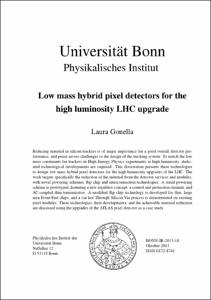Gonella, Laura: Low mass hybrid pixel detectors for the high luminosity LHC upgrade. - Bonn, 2013. - Dissertation, Rheinische Friedrich-Wilhelms-Universität Bonn.
Online-Ausgabe in bonndoc: https://nbn-resolving.org/urn:nbn:de:hbz:5n-34088
Online-Ausgabe in bonndoc: https://nbn-resolving.org/urn:nbn:de:hbz:5n-34088
@phdthesis{handle:20.500.11811/5792,
urn: https://nbn-resolving.org/urn:nbn:de:hbz:5n-34088,
author = {{Laura Gonella}},
title = {Low mass hybrid pixel detectors for the high luminosity LHC upgrade},
school = {Rheinische Friedrich-Wilhelms-Universität Bonn},
year = 2013,
month = nov,
note = {Reducing material in silicon trackers is of major importance for a good overall detector performance, and poses severe challenges to the design of the tracking system. To match the low mass constraints for trackers in High Energy Physics experiments at high luminosity, dedicated technological developments are required. This dissertation presents three technologies to design low mass hybrid pixel detectors for the high luminosity upgrades of the LHC. The work targets specifically the reduction of the material from the detector services and modules, with novel powering schemes, flip chip and interconnection technologies. A serial powering scheme is prototyped, featuring a new regulator concept, a control and protection element, and AC-coupled data transmission. A modified flip chip technology is developed for thin, large area Front-End chips, and a via last Through Silicon Via process is demonstrated on existing pixel modules. These technologies, their developments, and the achievable material reduction are discussed using the upgrades of the ATLAS pixel detector as a case study.},
url = {https://hdl.handle.net/20.500.11811/5792}
}
urn: https://nbn-resolving.org/urn:nbn:de:hbz:5n-34088,
author = {{Laura Gonella}},
title = {Low mass hybrid pixel detectors for the high luminosity LHC upgrade},
school = {Rheinische Friedrich-Wilhelms-Universität Bonn},
year = 2013,
month = nov,
note = {Reducing material in silicon trackers is of major importance for a good overall detector performance, and poses severe challenges to the design of the tracking system. To match the low mass constraints for trackers in High Energy Physics experiments at high luminosity, dedicated technological developments are required. This dissertation presents three technologies to design low mass hybrid pixel detectors for the high luminosity upgrades of the LHC. The work targets specifically the reduction of the material from the detector services and modules, with novel powering schemes, flip chip and interconnection technologies. A serial powering scheme is prototyped, featuring a new regulator concept, a control and protection element, and AC-coupled data transmission. A modified flip chip technology is developed for thin, large area Front-End chips, and a via last Through Silicon Via process is demonstrated on existing pixel modules. These technologies, their developments, and the achievable material reduction are discussed using the upgrades of the ATLAS pixel detector as a case study.},
url = {https://hdl.handle.net/20.500.11811/5792}
}






